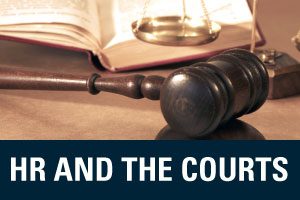HR and the Courts
Each month, CUPA-HR General Counsel Ira Shepard provides an overview of several labor and employment law cases and regulatory actions with implications for the higher ed workplace. Here’s the latest from Ira.
Federal Appeals Court Panel Expresses Skepticism Regarding New York City Teachers’ Challenge to the Constitutionality of the New York City Vaccine Mandate for All Public School Teachers
In a case which could have ramifications for public and private college and university vaccine mandates, a group of New York City teachers recently argued that the New York City mandate that all public school teachers have at least one vaccine shot violates their basic rights under the U.S. Constitution. The case was heard by the U.S. Court of Appeals for the Second Circuit, which covers New York, Connecticut and Vermont. The New York City mandate requires all teachers to have at least one vaccine shot in order to continue teaching or be suspended without pay. The mandate allows them to continue to receive benefits during the suspension, but bars them from teaching elsewhere (Maniscalco v. New York City Department of Education (2nd Cir: Argued Oct 14, 2021)). The case is one of dozens across the country contesting the validity of public and private employer vaccine mandates.
The teachers’ counsel argued that teaching is a profession and the vaccine mandate takes away the fundamental right of teachers to teach. One of the federal appeals court judges commented during the argument that she was having difficulty understanding why the mandate was “irrational” as argued by the teachers’ counsel.
Bipolar Teacher Loses Her Disability Discrimination Appeal Following Her Discharge for Violating the School District’s Rules on Sharing Religious Beliefs
In a case having general applicability to the Americans With Disabilities Act termination claims and requests for accommodation brought in the higher education context, the U.S. Court of Appeals for the Sixth Circuit, covering Michigan, Ohio, Kentucky and Tennessee affirmed a school district’s decision to terminate a teacher for inappropriate communication with students during her paid suspension. The appeals court concluded that a reasonable jury could not conclude that the teacher’s misconduct caused her discharge, notwithstanding her diagnosis of suffering from bipolar disorder (Lockhart v. Marietta City Schools (6th Cir., No. 20-4308, 10/15/21)).
The plaintiff was put on paid leave after telling her students that she had a deeply religious experience while shoveling snow in which she lost consciousness, was carried away and now God was speaking through her. She was instructed not to communicate with students while on paid leave. She violated the instruction and sent a student a 12-page letter telling them not to trust school administrators and to “Trust me, I am the one you need to trust. I dearly love you, have they told you they love you?”
The teacher argued that the school district should have accommodated her disability rather than terminate her. The court concluded that the school district was not required to excuse her misconduct during leave and that she repeatedly violated the terms of her administrative leave before even remotely asking for an accommodation request.
Some States May Alter, Change and/or Challenge OSHA’s New Vaccine Rules
Some states, through their respective attorney generals, have signaled that they may contest of try to alter the Occupational Safety and Health Administration (OSHA)’s vaccine mandate. OSHA allows by agreement some 26 states plus Puerto Rico and the U.S. Virgin Islands to adopt their own workplace safety rules. Those states include seven states with Republican attorney generals who have taken the position that a vaccine mandate is “disastrous and counterproductive.” The attorney generals of Alaska, Arizona, Indiana, Kentucky, South Carolina, Utah and Wyoming have written letters to OSHA stating that such a vaccine mandate does not meet the “grave danger” threshold needed to justify such an Emergency Temporary Standard. An additional two states, Texas and Arkansas, have taken steps to avoid a potential OSHA vaccination rule. Numerous challenges have been filed in federal court.
The cases challenging the new OSHA rules will be consolidated for one federal appeals court to rule on. Ultimately, the Supreme Court may step in.
Student Workers at Private University Seek Union Formation and Bargaining Rights Under the National Labor Relations Act
Recently, a student worker organizing committee at Kenyon College filed a petition with the National Labor Relations Board (NLRB) to represent 600 student employees at the Ohio college. The committee is asking the NLRB to conduct a union representation election for the proposed student worker bargaining unit. The current NLRB has apparently abandoned its position to limit union organizing among student workers at private colleges and universities over which the NLRB has jurisdiction.
In March 2021, the then Republican-controlled NLRB abandoned a proposal to block student workers at private colleges and universities form organizing. The NLRB’s current Biden administration appointed general counsel has since publicly backed expanding labor rights for student workers.
Sex Harassment Case for Employee Perceived as Gay Is Headed to Trial Based on Alleged Physical Attacks and Discrimination for Failure to Conform to Sexual Stereotypes
A heterosexual employee who was mistakenly perceived as gay and harassed by a supervisor because of the misperception received the right to proceed to a trial over his sex harassment claim. The trial court cited the Supreme Court decision in Bostock v. Clayton County and following decisions which have interpreted Title VII to protect against discrimination based on sexual orientation, gender identity, and/or failure to conform to sexual stereotypes (Roberts v. Glenn Industrial Group ( 2021 BL 404870. W.D.N.C. No.3:17- cv-00747, 10/21/21)).
The plaintiff complained and the court agreed that the alleged harassment — if proven — was severe and pervasive and included physical assault by his supervisor in which his safety glasses were knocked off and he was put in a choke hold by his supervisor.



